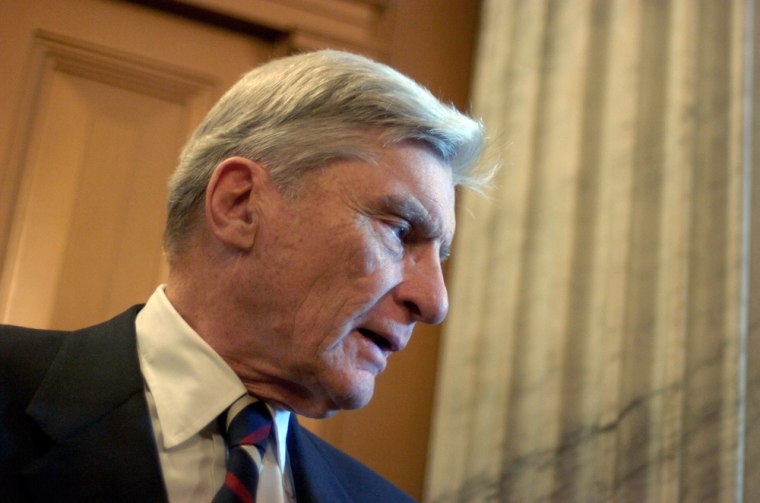Republican Sen. John Warner of Virginia, one of the most authoritative voices in Congress on the military and a key figure in the debate over Iraq, said Friday he will not seek a sixth term in 2008.
Warner, 80, was elected in 1978, after the dashing former Navy secretary campaigned alongside his wife at the time, Elizabeth Taylor.
Warner is leaving what would have been a safe seat for the Republicans if he had chosen to run again. His departure gives Democrats a better chance to protect or even expand their one-seat majority in the Senate.
Warner said he still feels spry enough for the rigors of the Senate, but he did not want to push it for another six years.
“I want to be fair to this wonderful state, which has been eminently fair to me all these years,” Warner said.
His message to Virginians, he said, is: “You’ve given me my best shot, and I’m quietly gong to step aside and make way for others.”
Bold Iraq statements
Warner, former chairman of the Senate Armed Services Committee, has long been an important voice in the Iraq debate because of his military expertise and his willingness to question White House war policy.
After a recent trip to Iraq, Warner said President Bush should start bringing some troops home by Christmas. If Bush refused, Warner said, he would consider backing anti-war legislation. The statement was the senator’s strongest to oppose the White House and is expected to influence the Iraq debate this fall.
Warner, a courtly senator with chiseled features and a full shock of white hair, chose a sentimental setting for his announcement: the steps of the University of Virginia’s signature structure, the Rotunda, designed by school founder Thomas Jefferson.
Warner attended the university’s law school in the late 1940s and 1950s, an education that was interrupted by service as a Marine in Korea.
The most likely Democratic contender is former Gov. Mark R. Warner, a wealthy Alexandria businessman who left office in early 2006 with unprecedented job-approval ratings. Mark Warner, who is not related to the senator, unsuccessfully challenged him in the 1996 Senate race.
The nomination battle among Republicans will probably include former Gov. Jim Gilmore and U.S. Rep. Thomas M. Davis.
Clinton: A ‘friend and colleague’
The GOP nominated Warner for the Senate in 1978 after the party’s first choice, Richard Obenshain, was killed in a plane crash. Warner was elected by just 4,721 votes out of 1.2 million cast. He was easily re-elected in 1984 and 1990. He beat Mark Warner by 5 percentage points in 1996 and was unopposed in 2002.
In announcing his decision, Warner cited his age and recalled the strain of his trip to Iraq.
“It was day and night, jumping on and off helicopters, cargo planes, shaking hands, quickly eating and moving on,” Warner said. He said that he withstood it, but didn’t know if he could do so again years later.
Sen. Hillary Rodham Clinton said she will miss her “friend and colleague.”
“At a time when the tone in Washington is so often defined by partisanship and rancor, Senator Warner has always risen above the fray,” Clinton said.
In 1996, the conservative wing of his own party tried to deny Warner a fourth term. Warner had angered conservatives two years earlier by opposing GOP nominee Oliver North’s bid to unseat Democratic Sen. Charles S. Robb. Warner declared the Iran-Contra figure unfit for public office and backed an independent who drew enough votes from moderates to ensure Robb’s re-election.
Angered by what they viewed as party disloyalty, GOP conservatives backed former Reagan administration budget director Jim Miller to challenge Warner for renomination. Warner easily defeated Miller in a primary.
Warner mended his relationship with the GOP by supporting the successful campaigns of Gilmore for governor in 1997 and George Allen for Robb’s Senate seat in 2000.
Second longest-serving senator
Gov. Timothy M. Kaine, a Democrat, called Warner “a good friend, a great Virginian, and a true statesman.”
“All Virginians should honor his distinguished leadership,” Kaine said.
Warner is Virginia’s second longest-serving senator, with a tenure surpassed only by that of Sen. Harry F. Byrd Sr., who held office from 1933 to 1965.
